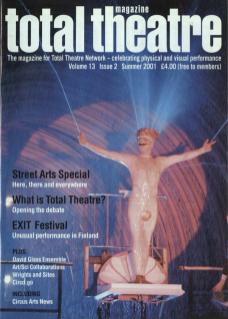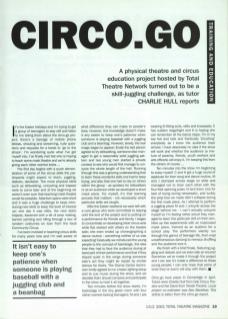It's the Easter holidays and I'm trying to get a group of teenagers to stay still and listen to me telling them about the circo.go project; there's a barrage of mobile phone bleeps, shouting and screaming, rude questions and requests for a break to 'go to the shops'. I'm wondering quite what I've got myself into. I've finally met Kat who is hoping to teach some mask theatre and we're already giving each other worried looks... The first day begins with a quick demonstration of some of the circus skills the participants might expect to learn; juggling, diabolo, devilstick. The more physical skills such as stiltwalking, unicycling and trapeze were to come later and at the beginning we weren't even sure that teaching mask theatre would be possible. Attention spans were short and it was a huge challenge to keep introducing new skills to keep the level of interest up: one day it was stilts, the next static trapeze, leavened with a bit of prop making, banner painting and rifling through a box of random costumes on loan from the local Community Circus.
I've been involved in teaching circus skills for many years now and I'm well aware of what difference they can make to people's lives; however, this knowledge doesn't make it any easier to keep one's patience when someone is playing baseball with a juggling club and a beanbag. However, slowly, the real magic began to appear, finally the last person agreed to try stiltwalking, someone else managed to get a reasonably solid juggling pattern and two young men started a private contest to see who would first manage to unicycle the whole length of the hall. Running through this was a growing understanding that to learn these wonderful skills one had to keep trying, and also that one had to rely on others within the group – as spotters for stiltwalkers or as an audience while we developed a short mask piece. For myself, it's that learning process that matters – not necessarily which particular skills are taught.
After the Easter weekend we were left with a core group who were committed to staying until the end of the project and to putting on a performance for friends and family. I began to concentrate on developing short circus acts while Kat worked with others on the theatre side; she even ended up choreographing a dance routine – something neither of us was expecting! Gradually we introduced the young people to the concept of backstage, the idea that they had to face the audience during at least part of their performance and that if they stayed quiet in the wings during someone else's act they might be repaid by similar silence for theirs. The Drama Centre technician kindly agreed to run a basic lighting setup and to cue music during the show, and we decided that I should compere and participate in the show to hold it all together.
It isn't easy to keep one's patience when someone is playing baseball with a juggling club and a beanbag.
Two minutes before the show starts; I'm backstage in the tiny green room with four rather worried-looking teenagers: M and Jare wearing ill-fitting suits, stilts and kneepads; C has sudden stagefright and K is hoping she can remember all the dance steps. I'm in my top hat and tails and frantically 'shushing’ everybody as I know the audience have arrived. I have absolutely no idea if the show will work and whether the audience (a mixture of parents, friends, youth workers and arts officers) will enjoy it. I'm keeping this from the others of course...
Ten minutes into the show I'm beginning to enjoy myself. C and K got a huge round of applause for their song and dance routine, M and J stomped across stage on stilts and managed not to brain each other with the four-foot spinning poles I'd lent them (not for lack of trying during rehearsals), and luckily the prop tree we made didn't collapse during the first mask piece. As I attempt to perform a juggling piece M and J unicycle across the stage behind me. I can't actually unicycle myself so I'm feeling rather proud they managed to learn this particular skill on their own. Next up Kat experiments with an improvised mask piece, themed as an audition for a school play. The performers silently run through the gamut of teenage life, from mad unselfconscious dancing to nervous shuffling and the audience love it.
We finish with a brief finale, featuring juggling and diabolo and we even rate an encore! Somehow we've made it through the project and I can see it's made a difference to these young people; I can only hope that some of what they've learnt will stay with them.
Circo.go took place in Cambridge in April. Tutors were Charlie Hull from Grip Circus Theatre and Kat Davis from Trestle Theatre. Local project coordinator was Alex Baraltser. This article is taken from the circo.go report.

